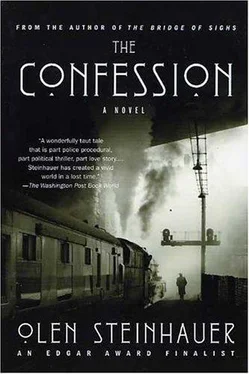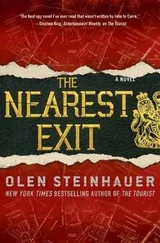Olen Steinhauer - The confession
Здесь есть возможность читать онлайн «Olen Steinhauer - The confession» весь текст электронной книги совершенно бесплатно (целиком полную версию без сокращений). В некоторых случаях можно слушать аудио, скачать через торрент в формате fb2 и присутствует краткое содержание. Жанр: Политический детектив, на английском языке. Описание произведения, (предисловие) а так же отзывы посетителей доступны на портале библиотеки ЛибКат.
- Название:The confession
- Автор:
- Жанр:
- Год:неизвестен
- ISBN:нет данных
- Рейтинг книги:5 / 5. Голосов: 1
-
Избранное:Добавить в избранное
- Отзывы:
-
Ваша оценка:
- 100
- 1
- 2
- 3
- 4
- 5
The confession: краткое содержание, описание и аннотация
Предлагаем к чтению аннотацию, описание, краткое содержание или предисловие (зависит от того, что написал сам автор книги «The confession»). Если вы не нашли необходимую информацию о книге — напишите в комментариях, мы постараемся отыскать её.
The confession — читать онлайн бесплатно полную книгу (весь текст) целиком
Ниже представлен текст книги, разбитый по страницам. Система сохранения места последней прочитанной страницы, позволяет с удобством читать онлайн бесплатно книгу «The confession», без необходимости каждый раз заново искать на чём Вы остановились. Поставьте закладку, и сможете в любой момент перейти на страницу, на которой закончили чтение.
Интервал:
Закладка:
I twisted the blankets tighter around my legs and tried to still myself. But I couldn’t make the past go away any more than I could bring Malik back to life. I had killed him and brutalized a woman who loved me. And throughout it all, my feelings had remained just out of reach. I was an automaton.
Nestor had an excuse. He had struggled through a decade of terror and had come out the other side a machine of vengeance. I had been through so little in comparison, but I had acted the same. Both of us had watched our humanity slip away with a cool eye, and only after it returned could we understand what we had done.
I lay for an hour, stuck in the cycle of these thoughts. They repeated, and I turned each fact, each crime, around in my head, trying to find the justification. There was none, not even in the elegance of well-chosen words. I had always known what I was doing, and I knew that I would do it all over again.
Only after that hour, when I heard a tap at the door and saw Leonek’s unsure face peek through-he looked so young, and so good-did I understand what I needed to do to begin to right what had been made wrong. It was the only mature decision left to me.
86
It was simple and complicated at the same time. If it went wrong, I would not see them again. Leonek wanted to go. “This part is my case. He killed Sergei.”
I said, “Tell me. Do you still love Magda?”
He paused. “Yes. Yes, I do.”
“And Agnes?”
“I adore her, Ferenc.”
“That’s all I want to know.”
I drove everyone to Emil’s apartment. He answered the door, and though I had called to warn him, he was stunned by the sight of Louis and Nestor. Lena had prepared some small sandwiches. Louis and Nestor were surprised and very polite. It was a funny thing to see, in retrospect: a murderer and an informer sitting under Lena Brod’s expansive, approving gaze, eating her sandwiches. She went to the bar and began lining up drinks.
Emil and I took the reel-to-reel recorder back to my place. Although I explained everything on the drive, the whole sequence of events, by the time we were climbing my stairs he still looked back, and said, “But I don’t get it, Ferenc. What’s going on again?” It was only the rush of too many new facts that made his head spin.
Emil set up the reel-to-reel under the kitchen table. We put blankets over it to muffle the sound of the motor and tested it until it was silent. Only the microphone peeked out. Then I used a tablecloth over the whole thing. We walked around the table to make sure it was hidden.
“I’ll hide in the bedroom,” he said.
“No. He’ll check everywhere. He won’t want to be caught like he was at Stefan’s.”
“But you need some help.”
“You’ve helped enough, Emil. I’ll call when it’s over.”
He was still confused as I drove him home.
I arrived a little after eight, as the entertainment, two brothers who called themselves the Tatra Twins, was preparing to perform. The Crocodile was half-lit so that all the attention would be on the stage, where the brothers-who were as far from twins as one could imagine-strolled on wearing self-consciously large suits with bow ties and hats with the brims turned up. The large one, Balint, spun a wooden cane as he walked, while short, fat Boris waddled behind him, weaving in order to avoid getting hit. At the center they stopped and introduced themselves.
I didn’t see him, and I wasn’t completely sure he would come. The round tables were filled with groups of Russians dressed in fine eveningwear. My suit was noticeably cheap among them. I took a table near the stage because I wanted light to fall on me. This was imperative. The waiter looked at me strangely when I asked for a martini, so I instead ordered a palinka. The Twins began a rapid back-and-forth debate about their poverty-stricken village childhood, Balint sometimes shaking his head in apology to us all for his brother’s ignorance. They argued about who had less to eat, who was beaten more by their drunkard father, and which brother lost his virginity first. Each argument culminated with Boris receiving a slap and the audience convulsing in laughter.
The palinka was gone in no time, so I waved to the waiter for another.
Periodically, I looked back over the smiling faces raised to the stage. The women were a mix of Russian and local girls, but the men were all Russian. Their conversations mingled with the comedians’ hysterics and left me in a state of utter incomprehension.
He arrived with a very young woman, almost a girl, who held his arm at the elbow and laughed obligingly when he whispered to her. They took a table in the middle of the club, ordered, and watched the stage. The girl leaned into him and settled her head on his shoulder.
They both burst into laughter with everyone else.
I could be overt-it would certainly do the trick. But I wanted to make it back home. So I turned back to the brothers’ antics-Balint was using the cane now, bringing it down heavily as Boris skittered out of the way-but I couldn’t understand the humor at all.
When I looked back to the audience, I lost him for a moment. Then I found him because I was looking into his eyes. He had recognized my large form from the back, and was staring, no trace of smile left on his face.
I had been calm until then. I’d turned the plan over so many times that I knew it was the only thing to do, and in that surety there had been no fear. But looking into his eyes, the reasons for fear came back, and my hand was shaking when I raised my palinka beside my head, then nodded at him and turned back to the stage.
I drank it quickly because I did not think I could remain there much longer without screaming. So I walked out, hunched below the lights, and did not look over at him again, though I felt his eyes following me through the dark streets all the way home.
87
I didn’t have to wait long. Twenty minutes passed before I heard the steady footsteps in the stairwell, rising. I ran to turn on the machine, then covered it again. It was silent. Then there were three knocks on the door. “Ferenc?” He had a sparkling, happy voice. He sounded like an old friend.
I opened the door and saw what I hadn’t noticed before: how his left shoulder bulged beneath his jacket. The bandages over Nestor’s bullet. When he walked in he showed no sign of injury, but he took his hat off with his right hand a little awkwardly.
“How are you, Kaminski?”
“Mikhail, Ferenc. I think we can be on a first-name basis.”
“All right, Mikhail. Want something to drink?”
He shook his head. “I had one at The Crocodile. What were you drinking?”
“I asked for a martini, but couldn’t get one.”
He winked. “That’s because it’s an imperialist drink, Ferenc. I’m surprised at you.” Then he cocked his head. “Well, maybe I’m not. Tell me,” he said as he wandered to the kitchen and glanced around. “What is it you want?”
“What I want?”
“Well, you come to a regular spot of mine and wait until I see you, then you leave. You like vaudeville?”
“My favorite.”
“Pretty good, aren’t they?”
“I thought so.”
I had left both bedroom doors open, and he stood between them, glancing around. “Nice apartment,” He opened the bathroom door and sniffed. “Smoking on the crapper, huh?”
I smiled.
“So what did you want, Ferenc?”
“I was going to ask the same of you. You were here last night.”
He wandered back into the living room. “And you didn’t answer the door.”
“I wasn’t here. But we all have our informers. What did you want?”
He reached into a pocket for a cigarette, and when he lit it I noticed the unsteady left hand, which made the lighter flame wobble. “I came to talk to you about your case. Have you made any progress tracking this Nestor Velcea character?”
Читать дальшеИнтервал:
Закладка:
Похожие книги на «The confession»
Представляем Вашему вниманию похожие книги на «The confession» списком для выбора. Мы отобрали схожую по названию и смыслу литературу в надежде предоставить читателям больше вариантов отыскать новые, интересные, ещё непрочитанные произведения.
Обсуждение, отзывы о книге «The confession» и просто собственные мнения читателей. Оставьте ваши комментарии, напишите, что Вы думаете о произведении, его смысле или главных героях. Укажите что конкретно понравилось, а что нет, и почему Вы так считаете.












